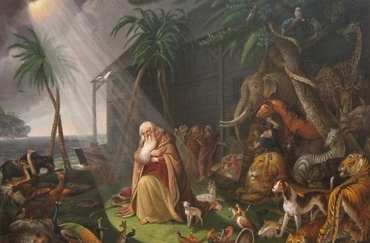5
At kukuha ka ng mainam na harina, at magluluto ka niyan ng labing dalawang munting tinapay: tigdadalawang ikasampung bahagi ng isang epa ang bawa't munting tinapay.
5
At kukuha ka ng mainam na harina, at magluluto ka niyan ng labing dalawang munting tinapay: tigdadalawang ikasampung bahagi ng isang epa ang bawa't munting tinapay.

In Genesis 1:24, beasts signify the things of man's will or loves. (Arcana Coelestia 44, 46)
In Genesis 9:10, beasts signify all that was living in the man of the Ancient Church, and also what belonged to his new will; likewise the lower things of his understanding and the will therefrom. (Arcana Coelestia 1026-1029)
In Psalm 104:20, beasts signify affections longing to be instructed, or spiritually nourished. (Apocalypse Explained 650[10])
In Luke 10:35, since the beast was a donkey, this signifies to instruct another according to his capability. (Apocalypse Explained 1154)
The beast of the south (Isaiah 30:6) signifies people who are principled in the knowledges of good and of truth, but do not apply them to life and instead to science.
Every beast and creeping thing (Genesis 8:19) signifies the goodnesses of the internal and external man.
"Beasts" represent the affection for doing good things, a true desire to do them from the heart. In the negative sense, "beasts" stand for the lust to do evil.
The beast ascending out of the sea (Revelation 13:1) signifies reasonings from the natural man confirming the separation of faith from life.
(Odkazy: Apocalypse Explained 13, 773; Revelation 13:11)
1154. Beasts of burden and sheep signifies profaned worship from truths and goods that are from a spiritual-natural origin. This is evident from the signification of "beasts of burden," as being the truths that look to charity (of which presently); also from the signification of "sheep," as being the goods of charity, as can be seen from all the passages in the Word where they are mentioned. (As in the following: Matthew 7:15; 9:36; 10:5, 6, 16; 12:10-12; 15:21-29; 18:12, 13; 25:31-41; 26:31; Mark 6:34; 14:27; John 10:1-18, 26-31; 21:15-17 and by passages in the prophets.) In these passages sheep signify those who are in the good of charity, therefore in an abstract sense, "sheep" signify the goods of charity. But "beasts of burden" signify the truths that look to the goods of charity, and as asses are especially meant, and these were used for riding and carrying burdens, things pertaining to use and to instruction were signified.
As in Isaiah:
They carry their wealth upon the shoulder of beasts of burden (Isaiah 30:6).
Wealth here signifies knowledges.
And in Luke:
The Samaritan set the man wounded by the robbers on his own beast of burden (Luke 10:34).
"To set him on his own beast of burden" signifies to instruct him according to his ability (See n. 375, 376, 444), where this is explained. What "beasts of burden" signify when asses are meant may be seen (n. 31, 140). It is said that "beasts of burden and sheep" signify truths and goods from a spiritual-natural origin, because such goods and truths are meant as are in those who are in the Lord's external church, and thus in the first or lowest heaven. These are natural, and yet they receive the spiritual, and are therefore called spiritual-natural. But here, as elsewhere, profaned worship from such truths and goods is meant.
(Continuation respecting the Athanasian Faith)
[2] The operation of the Divine providence, man not knowing it, may be illustrated by two comparisons. It is like a gardener collecting the seeds of shrubs, fruit trees, and flowers of all kinds, and providing himself with spades, rakes, and other tools for working the land, and then fertilizing his garden, digging it, dividing it into beds, putting in the seeds, and smoothing the surface. All these things man must do as if of himself. But it is the Lord who causes the seeds to take root, to spring forth out of the earth, to shoot forth into leaves, and then into blossoms, and finally to yield new seeds for the benefit of the gardener. Again, it is like a man about to build a house, who provides himself with the necessary materials, as timber, rafters, stones, mortar, and other things. But afterwards the Lord builds the house from foundation to roof exactly adapted to the man, though the man does not know it. From this it follows, that unless a man provides the necessary things for a garden or a house, he will have no garden with the benefit of its fruits, and no house and thence no habitation.
[3] So it is with reformation. The things that man must provide himself with are the knowledges of truth and good from the Word, from the doctrine of the church, from the world, and by his own labor. The Lord does everything else while man is ignorant of it. But it is to be known, that all things necessary to planting a garden or building a house, which, as has been said, are the knowledges of truth and good, are nothing but the materials, and have no life in them until man does them or lives according to them as if of himself. When that is done the Lord enters and vivifies and builds, that is, reforms. Such a garden, or such a house is man's understanding, for therein is his wisdom, which derives from love all that it is.